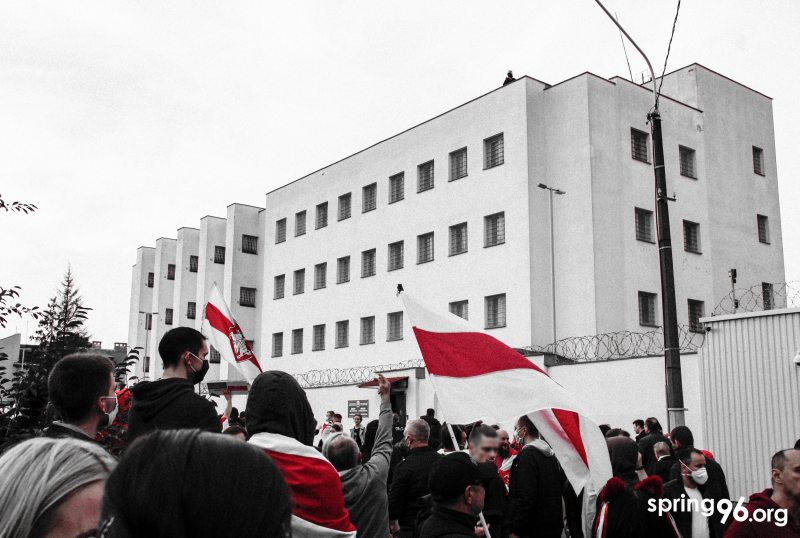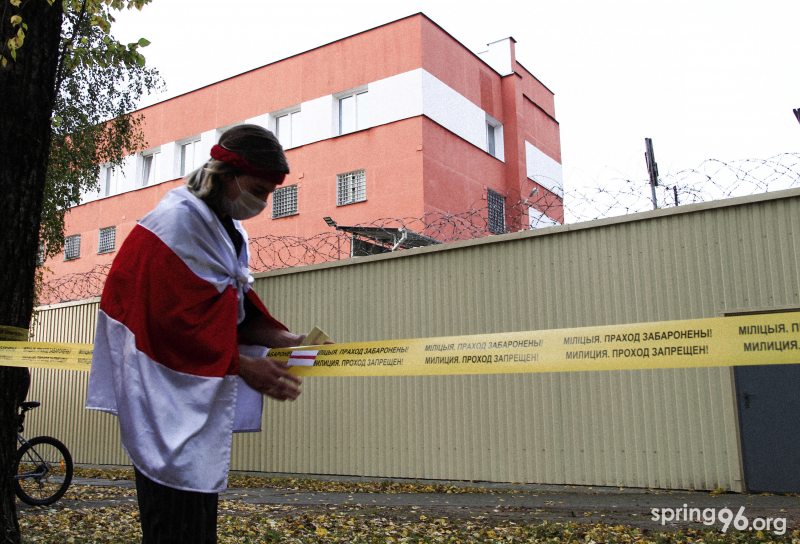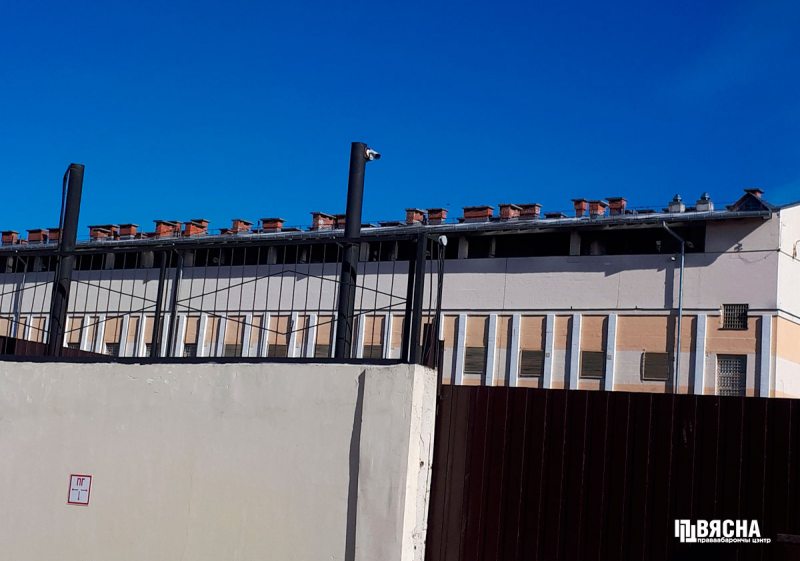"She used a rag during her period." Former prisoners spoke about the conditions in Belarusian temporary detention facilities
Every day for the past four years, human rights defenders have been recording the facts of mass persecution in Belarus. The human rights situation in the country remains critical. Since August 2020, every detainee has faced torture or ill-treatment. Dozens of people are detained every day across the country, while some are beaten and tortured, they are held in inhumane conditions, and the cells in the pre-trial detention centres are overcrowded. Viasna spoke with three former prisoners from Minsk, Viciebsk, and Homieĺ about the conditions where political prisoners are held, about medical care in pre-trial detention centres, and about the attitude towards foreign citizens awaiting deportation.
Viciebsk
"When I was released, I was very dehydrated."
Nastassia (name changed for security reasons) got into the Viciebsk temporary detention facility in January 2024, when the facility was moved to another building.
"It was very humid in the cell of the old temporary detention facility building. When you go in there, the first thing you notice is a very strong smell. It stank very strongly of both the toilet and sweat. Mold was on the walls and on the ceiling, and even the window was covered with large drops of water."
Not only political prisoners were there with Nastassia, but the whole cell suffered from special conditions: all prisoners were forbidden to smoke, and the checks were tougher.
"The food was much better than in 2020. But there was very little water, and that was a problem. It was possible to drink tap water on the old temporary detention facility, but there were problems with water in the new one due to repairs. When I was released, I was very dehydrated."
Care package for political prisoners were not accepted, only medical ones were.
"Of course, all the girls had a problem with pads"
According to Nastassia, in the morning during the medical check-up, one could ask for medicines, if they were accepted from one's relatives.
"Of course, all the girls had a problem with pads. They could only be requested from a medical worker. One girl, also convicted for political reasons, was afraid to ask for pads. They didn't give pads to her, so she used some kind of rag during her period, which she then washed in cold water and dried."
"At the new temporary detention facility, we were always moved exclusively in a stress position"
Outside the cell, political prisoners were constantly handcuffed behind their backs, Nastassia recalls:
"We were always handcuffed from behind. At the new temporary detention facility, we were always moved exclusively in a stress position, with our hands lifted behind our backs. Because of this, I started having very serious problems. I had a mental block: I refused to bend over and this led to a strong conflict. On the last day, I was afraid they wouldn't let me out. And because of my refusal, they always twisted arms themselves and led me like that, that is, they used physical force."
"They shouted that their parents didn't know where they were"
Together with Nastassia, two sisters from the Congo, who were awaiting deportation, were held in the Viciebsk temporary detention facility. The women were there for about three months. According to the former prisoner, due to the fact that the sisters were in the cell with the political prisoners, they were also kept in terrible conditions. They were not provided with an interpreter, and the natives of the Congo spoke only French.
"They were told the date of deportation was January 25th. They were really waiting for it. When nothing happened on the 25th, the girls staged a real riot: they threw slippers at the door, shouted loudly, slapped their hands on the tables. But the guards didn't do anything, just watched. It was pretty scary because they were crying, talking to me, shouting that their parents didn't know where they were. It was hard to watch, because you could't help them in any way.
Then there was a second riot. They were told that the deportation would be on January 30th, but we began to doubt again, because we knew that on the 30th there would be a move to another building. And on that day, the first morning check took place and they were not told anything about deportation. Then they opened the bathroom door, and that door must always be closed, because otherwise it blocks the view on the cell and the guards do not see anything and get angry. The guards started banging on the cell door and shouting for the door to be closed. The girls did not do this, but only shouted and threw slippers. One of them even shouted 'Kill me'."
Minsk
"They handcuffed me from behind and took me away"
61-year-old Volha (name changed for security reasons) was detained in the fall of 2023. The security forces came to her at 4 a.m. In addition to two employees of the GUBOPIK in plain clothes, there were four other people in masks and with machine guns. The woman's apartment was searched. When examining the woman's phone, they found subscriptions to "extremist channels".
In one of the books that the security forces threw on the floor during the search, Volha had money set aside for dental prosthetics. Upon returning after the days of detention, the woman did not find the money at home.
"I put on my coat and asked to take toothpaste with me. And they said they wouldn't let me use it there anyway. They handcuffed me from behind and took me away."
"It struck me that whole families were detained"

There were 10 women in the double cell, all of them political prisoners.
"The girls and I became friends there, and we supported each other. Mostly there were young people. It struck me that whole families were detained: someone's husband was in the cell opposite to ours, and the girls were here.
It was cold in the cell. We slept on the floor with wooden boards. We tried to cuddle up to each other to keep warm.
Sometimes they tormented us with ventilation: they turned it on for the whole night, and it made a terrible buzz. Or, for example, turned on the radiator at full capacity, and closed the feeder with ventilation."
"They asked if I was in a criminal gang."
After the trial, Volha was transferred to the Center for Isolation of Offenders at Akrescina. According to Volha, in the Center she was called "a grannie" and "a crone".
The prisoners asked the guards on duty every day to treat homeless women who were in the cell with them for lice, but no one paid attention to this. So the prisoners themselves helped them to wash.
On the day of Volha's release, security forces came to her cell and took her to another trial. She was arrested again and returned to a cell.
The security forced also interrogated the woman, and once tested her on a polygraph.
"They asked me if I was in a criminal gang and if I knew any criminals. They asked about donations, about treason, if I was in touch with foreign intelligence services, if I had produced protest products, if I went to marches."
"There was a girl with us who had an infant at home"
Before the next trial, Volha was transferred back to the temporary detention facility. Detained women in the cell began to argue loudly about something. At that time, even before the morning check, the head of the temporary detention facility came and told the women to take off all their outerwear and warm clothes. At the same time, it was freezing outside and it was very cold in the cells.
"It was the coldest night there, and the radiator was completely cold. And there was a girl with us who had an infant at home. She gave birth three months before. She cried endlessly.
I said that they wanted to make things worse for us and were coming up with different ways to do it.
They heard it and immediately there was a check, and some boss came and told us, 'Don't think that our task is to make you feel as bad as possible. Our task is to keep you until the trial, and then each of you will get what you deserve.'"
Homieĺ
 At the beginning of 2024, Ivan (name changed for security reasons) was serving administrative arrest in the Homieĺ temporary detention facility. For "spreading extremist materials" (Article 19.11 of the Administrative Code), the man was held behind bars for a month.
At the beginning of 2024, Ivan (name changed for security reasons) was serving administrative arrest in the Homieĺ temporary detention facility. For "spreading extremist materials" (Article 19.11 of the Administrative Code), the man was held behind bars for a month.
"Unlike other with administratively convicted people, the attitude towards political prisoners is terrible. Those convicted under political articles were given neither mattresses nor bed linen. They never took us out for a walk. They didn't take us to the shower.
According to the stories, I found out that seven cells are allocated for political detainees in the temporary detention facility, and two of them are women's cells."
Ivan shared the names of people who were with him in the temporary detention facility:
"There were different people in the cell with me. There was the head of the train, Siarhei Nason. Also opera singer Aleh Dudko with his son Hleb. They come from Dobruš. Aleh was arrested for hanging a Ukrainian flag in his car. Hleb was accused of photographing military equipment and passing the photos on to someone."

















